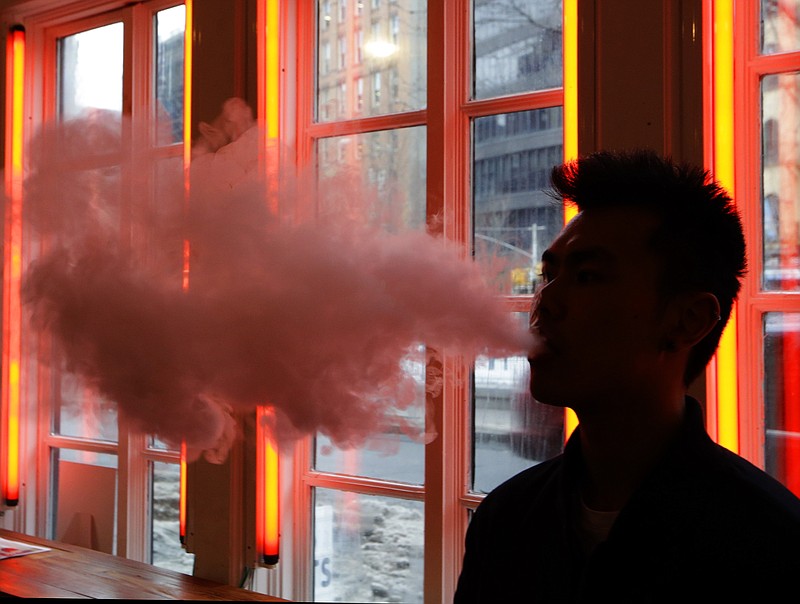If you looked closely, you could probably see the smoke coming out of the ears of cigar lovers and electronic-cigarette users across the metro area Thursday afternoon as word spread about new federal regulations for e-cigarettes and cigars.
"There are 400,000 people dying from tobacco illnesses, and this is the one product that is helping them quit," said Dimitris Agrafiotis, executive director of the Tennessee Smoke Free Association, a non-profit group representing many of the state's e-cig retailers. "Five million people have switched from traditional tobacco to e-cigs, and the industry should be applauded instead of using regulations to eliminate them from the market."
The U.S. Food and Drug Administration is proposing regulations to extend its health rules for cigarettes to cigars, electronic cigarettes (frequently referred to as e-cigs), water pipes and pipe tobacco. Retailers would be banned from selling to anyone under the age of 18, from selling the products in a vending machine, or giving away free samples. New blends of tobacco in cigars or pipe tobacco, and most e-cigarette components, including the heating elements and the liquid flavors, would need FDA approval before being offered for sale.
"We have more to do to help protect Americans from the dangers of tobacco and nicotine, especially our youth," Health and Human Services Secretary Sylvia Burwell said in a statement released Thursday. "As cigarette smoking among those under 18 has fallen, the use of other nicotine products, including e-cigarettes, has taken a drastic leap. All of this is creating a new generation of Americans who are at risk of addiction," she said.
E-cigs work by combining a heating element with a liquid that generally includes nicotine as well as other products, such as a flavoring. Since the liquid is heated and nothing is burned, smokers avoid the tar and other byproducts of traditional cigarette smoking, and advocates say they can help smokers kick the habit. Users are typically referred to as "vapers."
"This is being regulated as a tobacco product but it contains no tobacco," Agrafiotis said. "It is like saying milk is beef because it comes from a cow. There are a lot of e-cig products that contain no nicotine."
Agrafiotis also argued that the rules will force many small businesses to close, allowing the e-cig market to be dominated by the big tobacco companies that have the money to undertake a time-consuming and costly FDA approval process. Major tobacco companies already own several of the largest brands of e-cig devices.
"These are onerous, strict regulations," Agrafiotis said. "99.9 percent of the industry cannot follow them, and it will put a lot of mom-and-pop businesses out of business." There are more than 400 shops specializing in e-cigs in Tennessee, Agrafiotis said, employing more than 5,000 people.
What has concerned the FDA and health officials is how quickly e-cigs have caught on, particularly with teenagers. The devices were only introduced in the U.S. in 2009, but an October 2015 study found 22 percent of people aged 18 to 24 have tried e-cigs and 5 percent are regular users. Another recent study concluded that e-cigs are more popular than conventional cigarettes among high school students.
While there have been no studies that concluded that e-cigs are a clear health hazard, authorities worry because many of the heating elements are manufactured in China with no regulation, and there have been no requirements to label the liquids to identify their contents.
Many local stores also make their own liquids, creating their own custom flavors, a process that now apparently will require FDA approval, something most cannot afford to seek, according to the manager of one local e-cig store who asked that his name not be used.
The regulations could have a big impact on cigar smokers, as well.
"It will be a real shame if [these regulations] go through," said Mike Hunter, owner of Burns Tobacconist, which operates two premier tobacco stores in the area. "If it does, it will be a punch in the nose to the little guy."
Introducing a cigar with a different blend of tobacco would require obtaining FDA approval first, Hunter said, "and the rumor is it will cost $50,000 to have the FDA dissect your blend." That is too expensive for small operators who would have to travel to Nicaragua, the Dominican Republic or some other source of fine tobacco, craft a blend, and arrange for it to be rolled before starting the approval process, he said.
And if there are fewer custom cigars from small manufacturers, that will hurt his business, Hunter said.
"The first question out of a cigar customer's mouth when they come in the door is 'What's new?'" Hunter said. "It's really going to restrict the connoisseur who wants something new or something different."
According to The Associated Press, House Republicans may oppose the new regulations. A House committee last month approved industry-backed legislation that would bar the FDA from requiring safety reviews of e-cigarettes that are already on the market, and would exempt some premium and large cigars from the regulations.
Both Hunter and the Smoke Free Association's Agrafiotis predict the rules, which are set to take effect in August, will be challenged in court.
"There will be lawsuits," Hunter said. "The fight is far from over."
Contact staff writer Steve Johnson at sjohnson@timesfreepress.com, 423-757-6673, on Twitter @stevejohnsonTFP or on Facebook, at facebook.com/noogahealth.
